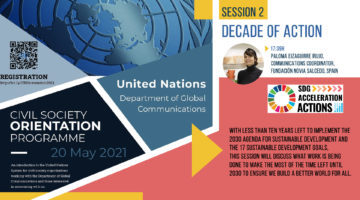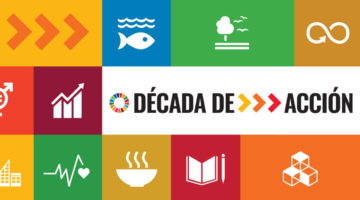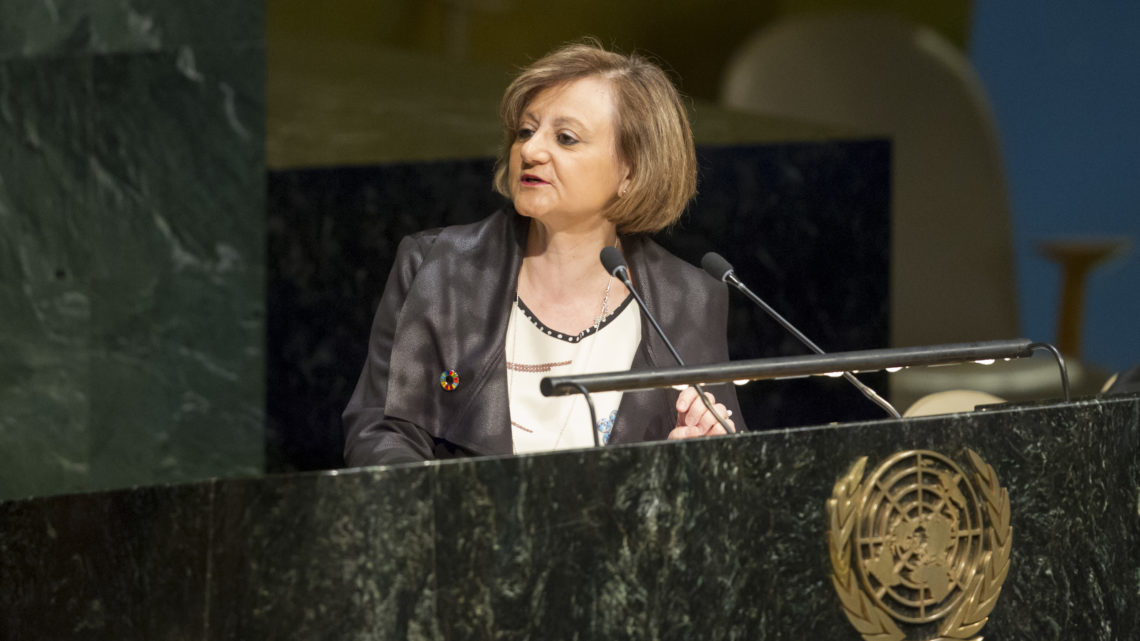What assessment would you make regarding the approval of the Sustainable Development Goals? What has been the most noteworthy progress?
The approval of the Sustainable Development Goals (SDGs) has been revolutionary. And, I’m not exaggerating! For the first time in history, all UN Member States are working together and without delay, at global and local levels, for the good of the people and the planet. Thanks to the 17 SDGs, we have a global framework that affects and involves every citizen in the world, with very ambitious goals, such as eradicating worldwide hunger, ending poverty, providing quality education for all boys and girls, or finally achieving gender equality. We also have a deadline: 2030.
These are ambitious goals, which means that we shall only see progress over time. However, we have already begun to note some differences in their implementation when compared to the 8 Millennium Goals. This is due to the careful work done to establish strict monitoring processes, a fact that translates into greater diligence in adopting legislation and taking action. For example, all countries have committed themselves to sharing their progress each year with other members. Furthermore, this strict supervision process has been strengthened by establishing a number of indicators and specific targets for each of the 17 goals. This provides us with more robust measurement processes.
Another very important aspect is the mobilisation of civil society, non-governmental organisations, and the private sector. From the moment the SDGs were discussed for the first time in 2014, all these groups became involved. First, they influenced the content of the agenda, particularly in laying the priorities and ensuring that the goals were clear and verifiable; then, they supported their implementation in September 2015, and now, they are monitoring compliance. The governments and public administrations must feel the pressure of the population. There is no doubt that this mobilisation translates into pressure!
It is also very important to emphasise the positive and decisive role played by scientific advancements. These technological developments are contributing significantly and they are facilitating the implementation of the agenda. All in all, we must have a positive outlook, but we cannot be smug. We must continue to work with tenacity and perseverance.
SDG No. 8 is “to promote sustained, inclusive and sustainable economic growth, full and productive employment and decent work for all”, work that millions of young people around the world cannot find. What can be done to improve this situation?
The SDGs have been designed with clear targets in addition to guidelines and indicators to verify compliance. This facilitates progress regarding each goal. The guidelines are there to assist governments, civil society, and the private sector. Among the targets of Goal 8, I would like to highlight three that I believe are crucial to improving the current situation, which is so worrying and difficult for our young people.
I believe it is key to achieve higher levels of economic productivity through diversification, technological upgrading, and innovation, by focusing on high value-added and labour-intensive sectors among other aspects.
I would also like to highlight the goal that seeks to promote development-oriented policies that support productive activities, decent job creation, entrepreneurship, creativity and innovation, and that recommends the growth of micro-, small- and medium-sized enterprises through access to financial services, among other things”.
And also, the goal that establishes that we must reduce the proportion of young people who are unemployed and not in education or training by 2020.
I am convinced that if we all work together to achieve these three ends at least, the current situation will change, no doubt about it. But it will not be easy…
What do you think about the International Campaign promoted by NSF and headed by the Government of Spain to Proclaim a Youth Employment Decade?
I really appreciate these projects and initiatives, and I believe that their contribution is essential and relevant. They are concrete examples of what I mentioned before, the involvement of civil society in mobilising all possible resources to make changes that will make this world a much better place for all.
The improvement in youth employment is a task that requires the simultaneous combination of macro and micro processes. In addition, an important part of the improvements will be felt in the medium and long term. That is why I think that proclaiming a “Decade” to mobilise resources, change the current situation, and plan outcomes is a good way to meet this great challenge. However, to have an impact, this mobilisation must be global: civil society, the private sector, and governments. We all need to take responsibility and commit ourselves to the proclamation of the “Decade” and to the work it will require. If this materialises, the “Youth Employment Decade” will lead to major changes.
I also believe that actions taken to promote the “Decade” can benefit from synergies with other international projects that promote additional goals. For example, the International Labour Organisation (ILO) and the UN’s Office of the Secretary General’s Envoy on Youth are committed to finding solutions to youth unemployment. Some of their ideas may have a positive impact for what the NSF is doing and on the “Decade”. I think it is a good thing to strive to frame the work being done on the “Decade” within a global plan for change and thus contribute to the improvement in youth employment at an international level.
At the NSF, we are convinced of the importance of civil society and the role it plays in achieving global goals. How can the United Nations benefit from the action of society? And the NSF in particular?
I have already referred to the key role that civil society plays in implementing the SDGs. In particular, I would like to stress the two fields in which it has the greatest chance of leading and promoting change. First of all, civil society can and should contribute to the dissemination of the 2030 Agenda. The more it is disseminated, the more people are aware of its potential to bring about change and of the commitments entered into to ensure its implementation, the better for all. Governments shall adopt it, they shall create coordination structures so that the various parts of the Public Administrations can get to work and make global plans to implement it. This task of dissemination is essential. If I may say so, we have to be heard, to mobilise, to explain, to inform… and we must be able to mobilise not only the public sector but also the private sector, businesses and corporations, as well as International Organisations. These play a role providing advice and pooling individual efforts.
As a result of this dissemination, civil society will come to perform an essential task of monitoring the implementation of the commitments made and contributing to the transparency of this process. In coordination with experts, scientists, academics, non-governmental organisations, through the media and using their own means, society should exert maximum pressure on governments, on the private sector, and on international organisations to meet the goals… and on time! Much is at stake: a healthy planet and a population that can enjoy a much better life.
New York, 17 April 2017













